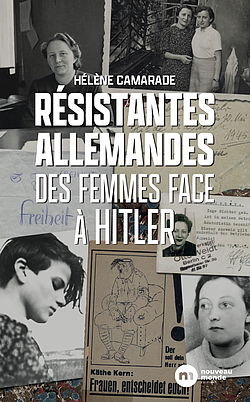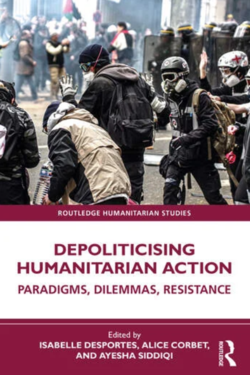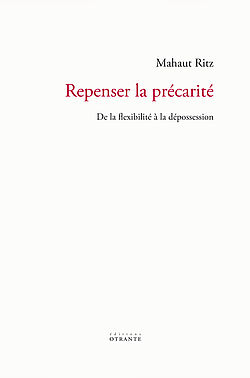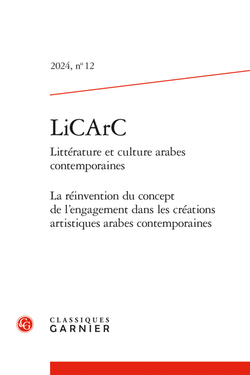Publikationen

Résistantes Allemandes. Des femmes face à Hitler
05.Februar 2025 MonographieEdition: Nouveau Monde Éditions
ISBN: 9782380946475
L’histoire de la résistance des Allemandes face à Hitler s’est diffusée surtout via la figure emblématique de Sophie Scholl et de la Rose blanche. Mais de nombreuses femmes se sont engagées contre le régime national-socialiste : avocates, féministes, communistes, aristocrates, membres de l’Orchestre rouge ou encore protestantes. Ce livre retrace les histoires aussi méconnues qu’extraordinaires de neuf résistantes aux origines et parcours différents, mais portées par un même combat.
Que ce soit en refusant de porter l’étoile jaune, en aidant d’autres femmes en prison ou dans les camps, en rédigeant des tracts, en aidant des Juifs ou en participant à la conspiration ayant mené à l’attentat du 20 juillet 1944 contre Hitler, elles ont été des actrices à part entière d’un mouvement dont l’Histoire n’a souvent retenu que des noms masculins.
Cette autre histoire de la résistance, nourrie de témoignages et d’archives inexploitées, redonne vie et rend justice à ces combat- tantes qui furent aussi après 1945 des médiatrices de la mémoire.
Hélène Camarade est professeure en études germaniques à l’Université Bordeaux-Montaigne et membre honoraire de l’Institut universitaire de France. Spécialiste de la résistance allemande sous le Troisième Reich et des phénomènes de résistance et d'opposition en RDA, elle a dirigé l’ouvrage Samizdat publié en 2023 aux éditions Nouveau Monde.

Christophe Schlingensief. L'art comme organisme vivant
30.Januar 2025 MonographieÉtudes Germaniques
Edition: Presses Universitaires Rennes
Collection: Études Germaniques
ISBN: 2753596832
Considéré de son vivant comme l’enfant terrible du cinéma et du théâtre allemands, Christoph Schlingensief (1960-2010) est demeuré jusqu’à ce jour la figure par excellence de l’artiste provocateur. Voici la première monographie en langue française sur l’œuvre d’un artiste qui appartient au panthéon du théâtre allemand contemporain, mais reste méconnu du public francophone. S’appuyant en outre sur des entretiens inédits avec ses collaborateurs directs, cet ouvrage aborde toutes les productions de Schlingensief : du cinéma au théâtre et à la performance, en passant par l’opéra.
À la lumière du concept d’organisme vivant, dont Schlingensief poursuit sans répit l’exploration, cet ouvrage saisit les différentes modalités d’interactions entre acteurs et spectateurs, œuvre et « milieu » dès ses premiers films et mises en scène à la Volksbühne en 1993.
Schlingensief a innové dans de nombreux domaines, tant pour la constitution de son équipe, mêlant acteurs professionnels et amateurs, certains en situation de handicap, que diverses formes performatives. Abolissant la frontière entre fiction et réel, il crée un parti politique ou un spectacle de télé-réalité avec des demandeurs d’asile.
À l’annonce de son cancer, le provocateur se trouve à son tour provoqué par la maladie, devenue réalité incontrôlable. Schlingensief fait alors de lui-même et de sa mort l'ultime matériau de son art.
Free Movement in Postwar Europe: Exploring a Multivalent Concept. Introduction
17.Januar 2025 HerausgeberschaftJournal of Modern European History, Volume 23 Issue 1
Collection: Journal of Modern European History, Volume 23 Issue 1
The progressive elevation of ideologies and discourses of free movement constitutes a vital narrative of modern European history. This introduction offers a brief genealogy of free movement in European thought and politics in modern liberalism since the late eighteenth century and outlines the actors, spaces and conflicts of free movement in postwar Europe. Furthermore, it offers a discussion of the place of free movement in recent historiography.
https://doi.org/10.1177/16118944241307766
"Decolonization of Migration in Divided Berlin: Berliner Künstlerprogramm and Artistic Representations of Migrant Subjectivities in the 1970s"
07.Januar 2025 Artikel (Online)Nazan Maksudyan, "Decolonization of Migration in Divided Berlin: Berliner Künstlerprogramm and Artistic Representations of Migrant Subjectivities in the 1970s", in: TRAFO – Blog for Transregional Research, 07.01.2025, https://trafo.hypotheses.org/54104

Depoliticising Humanitarian Action - Paradigms, Dilemmas, Resistance
01.Januar 2025
Isabelle Desportes
, Alice Corbet, Ayesha Siddiqi (Editors)
Edition: Routledge
ISBN: 9781032535098
Is it ever possible to separate humanitarian action from politics? Drawing on the experience of both practitioners and researchers, this book is an essential guide to the thorny interplay between what are too often considered as separate worlds.
The humanitarian sector aims to separate its work from politics, arguing that independence and neutrality are essential in order to gain entry into disaster and conflict settings. Yet, humanitarian claims of non-involvement in politics have also been dismissed as misleading, naive, or counter-productive. In practice, humanitarians find themselves working within political settings on a daily basis. This book investigates the theory behind depoliticisation, the political background and context behind humanitarian action, and the daily dilemmas faced by practitioners walking that fine line between principles and pragmatism. Finally, this book considers the importance of decolonising mainstream understandings of humanitarianism and politics, and of placing understandings from the Global South at the heart of the discussion.
Balancing theoretical insights with empirical grounding, field examples, and recommendations for policy and practice, this book is perfect for researchers and students in humanitarian studies, political science, international relations, human rights, development studies, disaster studies, and peace and conflict studies, as well as humanitarian practitioners and policy makers.

Repenser la précarité - De la flexibilité à la dépossession
01.Januar 2025 Edition: OrtanteSi l’on s’attache aux mots, il n’existe pas de « précarité » avant les années 1970. C’est à cette période qu’est thématisé pour la première fois, au moyen de ce terme, le problème de la qualité de l’emploi et de l’instabilité des conditions sociales d’existence. Dans les faits pourtant, la précarité existe dans les sociétés occidentales capitalistes avant les années 1970, et dans d’autres espace-temps. Ils sont le théâtre des conditions assujettissantes du travail et de la vie en société. Qu’ont alors de spécifique les formes d’organisation « précaires » de nos sociétés contemporaines ?
Cet ouvrage repart du contexte qui voit émerger la notion de « précarité » et la rattache à nouveaux frais à la flexibilité néolibérale dont elle est le pendant. Il revient sur les différents diagnostics émis au cours du temps par différents acteurs, à commencer par les sociologues. Mais l’enjeu n’est pas seulement diagnostique, il est aussi critique, car la « précarité » dénonce les conditions dégradées qu’elle cherche à saisir. Or, formuler une critique exigeante de la précarité implique, au regard d’une tradition philosophique qui s’interroge sur le sens de l’émancipation, que certains modèles critiques sont plus pertinents et efficaces que d’autres.
À la croisée de l’épistémologie des sciences sociales et de la philosophie sociale, cet ouvrage analyse et évalue différents modèles historiques de la critique de la précarité et invite à la reconsidérer au prisme de la dépossession.
Ouvrage publié avec le soutien du Centre Marc Bloch de Berlin et de l’Institut de Philosophie de Grenoble.

Cartographier la présence-absence L’Alep de Mohammad Al Attar
18.Dezember 2024 ZeitschriftenartikelLiCArC (Littérature et culture arabes contemporaines)
Edition: Classiques Garnier
Collection: LiCArC (Littérature et culture arabes contemporaines)
ISBN: 978-2-406-17538-4
Dans Alep, Portrait d’une absence, Mohammad Al Attar, exilé depuis 2012, fait surgir, par une succession de témoignages, la ville d’Alep, valant pour elle-même mais aussi en tant que métaphore. Mohammad Al Attar pense la représentation spatiale mentale comme « clé symbolique » pour appréhender le déracinement. Les réminiscences « remembrent », au sens rimbaldien, le pays d’autrefois, en révélant les contours du fantôme actuel.

Routledge Handbook of International Organization
09.Dezember 2024
Marieke Louis
,
Giulia Scalettaris
, Marieke Louis (dir.), Bob Reinalda (dir.),
ISBN: 9781032540696
This completely revised and rewritten handbook gives an overview of international organization (IO) as a dynamic field of research that adds to our understanding of global and regional relations and related domestic politics. Bringing together international scholars from a range of disciplines, it considers both IO as a process and multilateral organizations as institutions. This handbook is divided into five parts:
I. Documentation, sources and perspectives
II. International secretariats as bureaucracies
III. Actors within and beyond international bureaucracies
IV. Processes within and beyond international bureaucracies
V. Challenges to international organizations
Containing new chapters on topics such as the anthropological perspective, IO secretariats in several continents outside of Europe, feminization, the digital turn and challenges to IO legitimacy, the contributors reflect on the progression of IO studies from a burgeoning field to a well‑established subfield of international relations and the move away from scholarship based mainly in North‑Western Europe and the United States. This book will be of particular interest to scholars and students of IOs, global governance, diplomacy and foreign policy, as well as practitioners of multilateral cooperation.

„Local Climate and Energy Politics”
25.November 2024
Ulrike Zeigermann
,
Gilles Lepesant
Neues Sonderheft „Local Climate and Energy Politics” in der ZfVP
Das neue Sonderheft „Local Climate and Energy Politics” widmet sich den Herausforderungen, die sich durch Klimawandel und Energiekrise für Städte, Gemeinden und Regionen ergeben. Es wurde von den beiden assoziierten CMB Forscher:innen Ulrike Zeigermann (JMU) und Gilles Lepesant (CNRS) herausgegeben und in der Zeitschrift für Vergleichende Politikwissenschaft veröffentlicht.
Städte und Gemeinden stehen heute vor tiefgreifenden Veränderungen, die ihre sozialen, politischen und wirtschaftlichen Strukturen in Frage stellen. So gefährdet der Klimawandel mit Rekordtemperaturen und extremen Wetterereignissen die Versorgungssicherheit und soziale Stabilität in Städten und ländlichen Regionen. Das veränderte geopolitische Umfeld seit Februar 2022 führt zudem zu verstärktem Druck, sich von fossilen Abhängigkeiten zu lösen. Die Umsetzung von Klimaschutzmaßnahmen und der Ausbau erneuerbarer Energien auf der lokalen und regionalen Ebene stoßen jedoch oft auf Widerstand. Auch bei Klimaanpassungsmaßnahmen stellt sich die Frage, inwiefern diese sozial gerecht gestaltet werden (können). Andererseits zeugen Dynamiken in Bioenergiedörfern oder Energiegemeinschaften von vielversprechenden lokalen Innovationen. In diesem Zusammenhang stellen sich vielfältige Fragen zu neuen Formen der Kooperation und des Konflikts in der lokalen und regionalen Klima- und Energiepolitik. Einige dieser Fragen werden in den Beiträgen des Sonderheftes adressiert:
- Zeigermann, U., Lepesant, G. Local climate and energy politics: an introduction. Z Vgl Polit Wiss 18, 131–140 (2024). https://doi.org/10.1007/s12286-024-00613-y
- Lepesant, G. Between hard protection measures, nature-based solutions, and managed retreat: Adapting coastal areas to sea level rise in the Netherlands and France. Z Vgl Polit Wiss 18, 141–156 (2024). https://doi.org/10.1007/s12286-024-00591-1
- Dreyfus, M. Litigation as an obstacle to renewable energy development in France—tilting at windmills?. Z Vgl Polit Wiss 18, 181–205 (2024). https://doi.org/10.1007/s12286-024-00598-8
- Töller, A.E., Garske, B., Rasch, D. et al. Failing successfully? Local referendums and ENGOs’ lawsuits as challenges to wind energy expansion in Germany. Z Vgl Polit Wiss 18, 273–301 (2024). https://doi.org/10.1007/s12286-024-00610-1
- Thomeczek, J.P. Die (geringe) Beteiligung am Berliner Klimaentscheid 2023: Empirische Erklärungsversuche. Z Vgl Polit Wiss 18, 303–322 (2024). https://doi.org/10.1007/s12286-024-00609-8
- Beuerle, B. The Sakhalin Climate Experiment. Z Vgl Polit Wiss 18, 251–272 (2024). https://doi.org/10.1007/s12286-024-00606-x
- Guhl, F., Zeigermann, U. Local heat transitions—a comparative case study of five bioenergy villages in Northern and Southern Germany. Z Vgl Polit Wiss 18, 157–179 (2024). https://doi.org/10.1007/s12286-024-00596-w
- Dudka, A., Magnani, N. Do energy communities need to be local? A comparative study of two energy cooperatives in Europe. Z Vgl Polit Wiss 18, 227–249 (2024). https://doi.org/10.1007/s12286-024-00601-2
- Kochskämper, E. Just transformations through resilience experiments? Comparing policy rationales and narratives of the Global South and North in the Resilient Cities Network. Z Vgl Polit Wiss 18, 207–226 (2024). https://doi.org/10.1007/s12286-024-00599-7
Das Special Issue geht aus einer internationalen Fachtagung hervor, die im Oktober 2022 am Centre Marc Bloch in Berlin im Rahmen des Forschungsschwerpunktes zu „Umwelt, Klima, Energie: Gesellschaften und ihre ökologischen Herausforderungen“ unter der Leitung von Gilles Lepesant und Ulrike Zeigermann veranstaltet wurde.